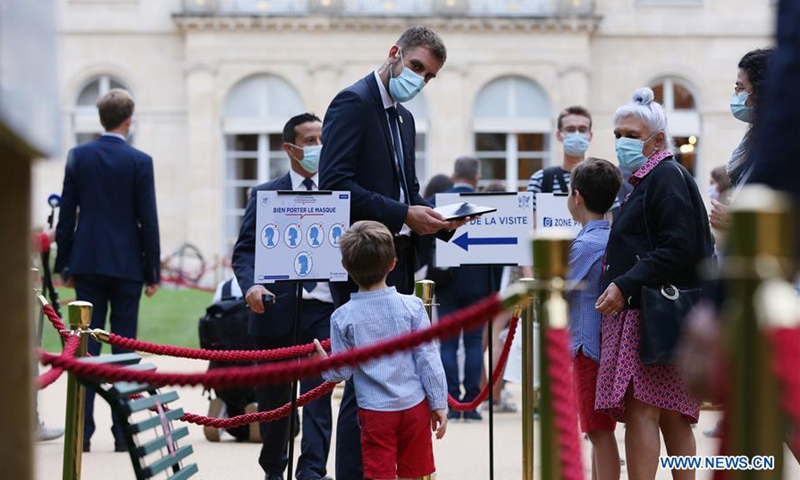Europe imposes new lockdowns
Source: AFP Published: 2020/10/14 17:03:40
Setback for vaccine hopes as two trials are suspended

A staff member checks the information of visitors at the Elysee presidential palace in Paris, France, Sept. 19, 2020. Some historical sites are opened to the public this weekend in France to mark the European Heritage Days, a cultural event held in September each year. (Xinhua/Gao Jing)
As Europe imposed new restrictions to try to stall a surging second wave of COVID-19, hopes for vaccines to rapidly provide relief suffered a blow Tuesday with the suspension of two clinical trials in the US.The virus is still spreading rapidly worldwide, with over 1 million deaths and 37 million infections. Many nations that suppressed their first outbreaks now face a second wave.
Hopes for a rapid vaccine rollout suffered a setback as US pharmaceutical firm Eli Lilly said it had suspended the Phase 3 trial of its antibody treatment over an unspecified incident, the second in less than 24 hours after Johnson & Johnson ran into a similar problem.
In Europe, the Netherlands imposed a "partial lockdown" to curb one of the region's worst coronavirus surges, with all bars, cafes and restaurants to close, and non-medical face coverings mandatory in all indoor spaces for people aged over 13.
In Britain, Labour opposition leader Keir Starmer called for a 2-3 week "circuit break" lockdown to slow the rates, saying the government had "lost control" of the outbreak having ignored stringent measures suggested by scientific experts on September 21.
French President Emmanuel Macron is expected to announce tighter restrictions and faster testing in a prime-time TV interview late Wednesday, with some media speculating Paris and other cities could face evening curfews.
In scenes contrasting with the fumbled testing efforts elsewhere, health workers in protective clothing swiftly set up tents and residents queued up to provide samples.
As the rest of Europe struggled to contain the disease, Russia also reported its highest-ever number of daily virus deaths, at 244, and a record number of new cases at almost 14,000.
In opposition to lockdowns and social distancing, some politicians have proposed letting the coronavirus circulate in the population to build up "herd immunity" - where so much of the population has been infected that there are insufficient new victims for the virus to jump to.
But the WHO has dismissed such plans as "ethically problematic" and requiring mass vaccinations to work.
Furthermore, study published in The Lancet Infectious Diseases journal indicated that exposure to the virus may not guarantee future immunity -- and the second infection could come with even more severe symptoms.
Despite the vaccine testing setbacks, which health experts say is normal as testing scales up massively in its later stages, the World Bank approved $12 billion for developing countries to finance the purchase and distribution of vaccines, tests and treatment.
The financing "aims to support vaccination of up to a billion people," the bank said.
AFP
Posted in: CROSS-BORDERS